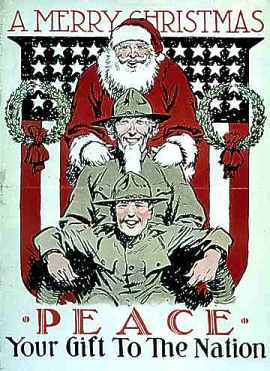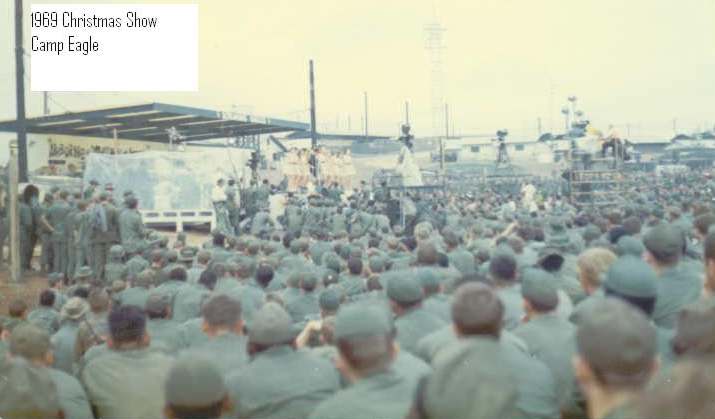|
Posted on 12/24/2014 6:00:06 PM PST by Kathy in Alaska
|

|
In!
(((HUGS))) and Merry Christmas, Kathy!
Merry Christmas Ma!









![]()

![]()

![]()

![]()

![]()

![]()
Merry Christmas to one and all.
In 1741, George Frederick Handel faced the fact that London audiences were no longer interested in Italian opera. His two latest operas had bombed, and Handel was seriously thinking of leaving England and returning to the German-speaking world.
During Holy Week, London’s theaters were closed, and Charles Jennens, Handel’s favorite librettist, came up with a religious work that could be presented in the theater during that week. An oratorio, which is a religious cantata, would guarantee Handel a full house, which is the goal of every composer who writes music for a living. Handel knew that the authorities would not make an exception for Holy Week even for a religious piece, so the idea went in another direction. Handel decided to take his new work, “Messiah”, to Dublin in the fall of 1741 where it was received with great acclaim.
The first London performance in 1743 got a less pleasant reception. There were objections to using a theater as a venue for the performance of a sacred work and to using operatic singers of dubious personal morality to sing it. Even Jennens had issues with some of Handel’s music, which brought on yet another stroke for poor Handel, who had experienced a major stroke in 1737.
Each time “Messiah” was staged, Handel made adjustments to the score. Sometimes a piece was lengthened or shortened due to artistic instincts. Sometimes it was re-scored for different voice. Sometimes the weakness of a particular singer required a rewrite. Hogwood uses the 1754 Foundling Hospital version, by which time Handel had pretty much stabilized the score.
“Messiah” is written in three acts. Part 1 covers the prologue to Christ’s birth to his entry into Jerusalem. Part 2 covers his suffering, death and resurrection, and the spreading of the gospels by his disciples. Part 3 covers the promise of eternal life. Each part is structured like the act of a Baroque opera.
Jennens’ idea was to use quotes from the Old Testament to explain quotes from the New Testament. Direct narrative is avoided, and no singer has to impersonate Jesus, which would have been considered blasphemous. (The one exception to this was setting the various Passions to music, which Bach did.)
Instruments of that period were quite different from today, as were the performance practices of the Baroque era.
String instruments played with gut strings, not steel. The sound decay rate for gut is more rapid, and that gives the strings a thinner, more plangent quality. Vibrato, which is ubiquitous today, was used only rarely and for expressive effect. At the time, there were a large number of markings in the score for bowing and articulation, most of which have been forgotten over the centuries. After Handel, Leopold Mozart, Wolfgang’s father, wrote the first violin tutorial, which explains in detail just how these various markings are to be played. The period instrument movement has revived these techniques, which are quite different from how string instruments are played today.
The wind instruments had not yet been supercharged and had smaller bores. The (French) horn of the era was the valveless hunting horn, which was unreliable in pitch. Composers of the era used those horns for their humorous effect.
The vocal tradition of the era avoided vibrato, and the lack of vibrato gives the human voice a very different quality. Singers were expected to improvise their own ornamentation using the written score as a guideline. This was especially true in da capo arias which are written in A-B-A structure. The first time through the “A” section, the vocalist was expected to follow the score. The second time through, the vocalist was expected to ornament the written vocal line to show off his or her chops.
Choristers did not include women, and the soprano roles were sung by little boys.
Both orchestras and choruses were small in size.
Speed indications had a different meaning in the Baroque era. All Baroque music is dance music, even religious music. An instruction like allegro indicates a quick dance tempo, and adagio indicates a slower dance tempo. The modern interpretation of these instructions comes from the Victorian era, when many traditions were lost. Hogwood avoids the modern for a Baroque understanding of what these instructions mean.
Baroque operas begin with an overture. The format is a slow introduction with dotted notes in duple time, followed by a fugue, followed by a march, gigue or minuet. But Handel knew what he was doing, and he stops the fugue cold with a cadence in E minor, making way for human voice. Note the atmosphere, not so much of joy, but of anticipated joy. At 1:36 the sense of yearning for the Christ figure is palpable.
The purpose of a recitative is to link larger musical numbers and change key. An unaccompanied recitative involves a singer backed by a harpsichord and often cello. An accompanied recitative backs the singer with the string section. “Comfort ye my people” is an accompanied tenor recitative leading into a tenor aria, ‘’Every valley shall be exalted”, where Handel uses the Baroque technique of word painting. Note the music for the words “crooked” and “straight”. Note also the lack of vibrato in Elliott’s rendition and his cadenza at the end backed only by a thin bass line. (The lyrics come from “Isaiah”.)
Handel introduces the chorus, “And the glory of the Lord”, with low voices first, giving him the ability to amplify as the piece goes on. (Isaiah) This leads into an accompanied recitative for bass, “Thus saith the Lord”. (Haggai & Malachi)
Every Baroque opera had a big production number in each act, and a soprano aria, “But who may abide the day of his coming”, is the big production number for Part 1. Note Emma Kirkby’s lack of vibrato, which makes her sound like a young boy. Also note how she shows off her chops in the second run through the material, especially the cadenza. Her ornamentation is absolutely hair raising. (Malachi)
Handel liked to recycle material from his Italian operas on occasion, and this chorus, “And he shall purify”, is an example. (Malachi) It is followed by a recitative for contralto, “Behold, a virgin shall conceive”. (Isaiah)
”O thou that tellest good tidings to Zion” is a contralto aria that expands into a chorus.
Following is a recitative for bass, “For behold, darkness shall cover the earth”. Note the sudden change in atmosphere and how Handel shows darkness and the change to light at 27:23. This leads into a bass aria, “The people that walked in darkness”, with a wandering string line minus harmony, symbolizing wandering in the darkness. The magic moments occur at 28:56 and 29:56 where the darkness is dispelled. (Isaiah)
Following is another chorus derived from one of Handel’s Italian operas, “For unto us a child is born”. (Isaiah)
”Pifa”, sometimes translated as “Pastoral Symphony”, is Handel’s attempt to recreate the sound of shepherds’ bagpipes. It grew in length over the years, but by 1754 Handel had reduced it to its original 11 bars as a lead-in to four short accompanied soprano recitatives, each intended to ratchet up the tension. They in turn lead into a chorus, “Glory to God”, where the trumpets appear for the first time. Note the word painting, high voices for heaven and the low voices for peace on earth. At the end, Handel marks the ending pianissimo as the vision fades. (Luke)
Even though there is no mention of the Lord as “bridegroom”, Handel’s original version of this soprano aria, “Rejoice greatly, O daughter of Zion”, featured a violin playing a gigue, the instrument and dance associated with weddings. The time signature for this early version was 12/8. By 1754, Handel had changed the time signature to 4/4, and this little detail disappeared. (Zechariah)
This leads into a soprano recitative, “Then shall the eyes of the blind”, which in turns leads into a soprano aria, “He shall feed his flock”. This started out as a piece for contralto, then for duet, but by 1754 Handel had settled on handing it to the soprano. (Isaiah & Matthew)
Handel turned to recycling Italian opera for this final number, “His yoke is easy, and his burthen is light”. Note the Elizabethan spelling of “burden” as “burthen”. (Matthew)
Part 2 is a long series of numbers intended to culminate in the resurrection, and Handel builds it slowly. It is similar to the Passion works of Bach. Handel uses the dotted rhythms of a Baroque overture to start “Behold the lamb of God” and brings in the lower voices first. (John)
But Handel wastes no time and launches into his big production number for Part 2, a contralto da capo aria, “He was despised”. In the “B” section, Handel uses the strings in short staccato strokes to portray the sound of scourging. As the “A” section returns, note Carolyn Watkinson’s ornamentation of the vocal line. At 1:04:46 when she launches into her short cadenza, if your screen isn’t blurry, you have so soul! (Isaiah)
Three short choral numbers are recycled from an earlier Italian opera. “Surely he hath borne our griefs” sets the table. “With these stripes we are healed” is developed as a fugue. The third, “And we like sheep,” is not what you think it is! (Isaiah)
The next two linked numbers start with a recitative for tenor, “All they that see laugh him to scorn”. Note how Handel word paints the sounds of scourging, laughing and the shaking of heads. This leads into a mob chorus, “He trusted in God”, a crowd scene developed as a fugue. (Psalm 22)
The next two numbers are a recitative for tenor, “Thy rebuke has broken his heart”, and a tenor aria, “Behold, and see if there be any sorrow”. (Psalm 69 & Lamentations)
Two numbers are joined: a recitative for soprano, “He was cut off from the land of the living”, and a soprano aria, “But thou didst not leave his soul in hell”. (Isaiah & Psalm 16)
They lead into a chorus, “Lift up your heads, O ye gates”. Watch the buildup of the chord progression and its gentle unraveling from 1:23:57 to 1:24:43. It’s magical. (Psalm 24)
Now comes a recitative for tenor, “Unto which of the angels said he at any time”, followed by a chorus in the form of a fugue, “Let all the angels of God worship him”. (Hebrews)
The aria, “Thou art gone up on high”, was moved from bass to contralto in the years between 1741 and 1754, but Handel finally settled on handing it to the soprano. (Psalm 68)
The following chorus shows off Handel’s gift for word painting. Note the single notes for “The Lord gave the word” and the busy notation for “Great was the company of the preachers”, as if the preachers had entirely too much to say. (Psalm 68)
”How beautiful are the feet” is an aria that went through a number of changes between 1741 and 1754, but Handel finally settled on handing it to the soprano. (Romans)
”Their sound has gone out” is a chorus aimed at brevity. (Romans)
It is followed by a “rage” aria for bass in operatic style, “Why do the nations so furiously rage together”, which Handel shortened by nearly half over the years so that it could quickly lead into the next number, a mob chorus in the form of a fugue, “Let us break their bonds asunder”.
A tenor recitative follows, “He that dwelleth in heaven”, leading into a tenor aria, “Thou shalt break them”. (Psalm 2)
It’s time to release all that tension and bring Part 2 to a close. This is the best known number in “Messiah”, a chorus where the trumpets are heard for only the second time in the whole oratorio. It’s the first time for the tympani. This is the announcement of resurrection. At 1:42:02 Handel walks up to the edge of setting the chorus as a fugue, but backs away and settles for a canon. The ascending phrases backed by the trumpet are nothing short of magic, as he ratchets up the tension for the breakthrough at 1:43:00. (Revelation)
Part 3, unlike the other two parts, begins with a sense of certainty rather than anticipation. The issues have been resolved, and it’s time for a short epilogue on eternal life. “I know that my redeemer liveth” is a soprano aria that is one of the few pieces that underwent no revisions. Note Judith Nelson’s ornamentation as she repeats the material. (Job & 1 Corinthians)
This is followed by a chorus, “Since by man came death” and a bass recitative, “Behold, I tell you a mystery”. (1 Corinthians)
It’s time for the big production number for Part 3, “The trumpet shall sound.” This piece features the only instrumental solo in the work, written for trumpet. There would normally be a temptation to write a march here, but Handel resists the obvious to write a bass aria in 3/4. This aria was even longer in 1741, but Handel shortened it for the 1754 performance. Note the odd setting of the word “incorruptible”. Note also the use of the same musical phrase for “We shall be changed” everywhere it appears. This goes against the meaning of the line, which is why Charles Jennens criticized the composer’s approach. Handel’s word painting fails him. (1 Corinthians)
Following is a contralto recitative, “Then shall be brought to pass”, followed by contralto and tenor duet, “O death, where is thy sting”, which expands into the chorus, “But thanks be to God”, using the same musical material, all of which was recycled from an earlier Italian opera. (1 Corinthians)
”If God be for us” is an aria for soprano, then transposed for contralto, and then handed back to the soprano. Note Emma Kirkby’s vibrato-less voice and its boyish quality. (Romans)
Now it’s time for the grand finale, a series of three choruses beginning with “Worthy is the lamb that was slain”, followed by “Blessing and honor” set as a canon, finishing with a giant fugue with one word, “Amen”. Listen to that amazing wrap-up! (Revelation)


Blessings on Christmas to you and Safety to you all.

My boy is out tonight with the SF. G-d will watch over our soldiers and bless them.
Psalm 121 Complete Jewish Bible (CJB)
121 (0) A song of ascents:
(1) If I raise my eyes to the hills,
from where will my help come?
2 My help comes from Adonai,
the maker of heaven and earth.
3 He will not let your foot slip —
your guardian is not asleep.
4 No, the guardian of Isra’el
never slumbers or sleeps.
5 Adonai is your guardian; at your right hand
Adonai provides you with shade —
6 the sun can’t strike you during the day
or even the moon at night.
7 Adonai will guard you against all harm;
he will guard your life.
8 Adonai will guard your coming and going
from now on and forever.


Merry Christmas and thank you for posting these.
PS My son is home for Christmas.
 |
Merry Christmas To You And Yours! |
It was, I think, the sense that the music he brought us is still relevant that I would like to celebrate. Because it is, and it shines through the excesses of subsequent 100+ piece orchestras and the stage-craft that tended to stand between the late-century listener and the actual music itself. I love spectacle as well as the next fellow, but the music stands without it.
|
We lost Chris in September after a short illness.
Disclaimer: Opinions posted on Free Republic are those of the individual posters and do not necessarily represent the opinion of Free Republic or its management. All materials posted herein are protected by copyright law and the exemption for fair use of copyrighted works.